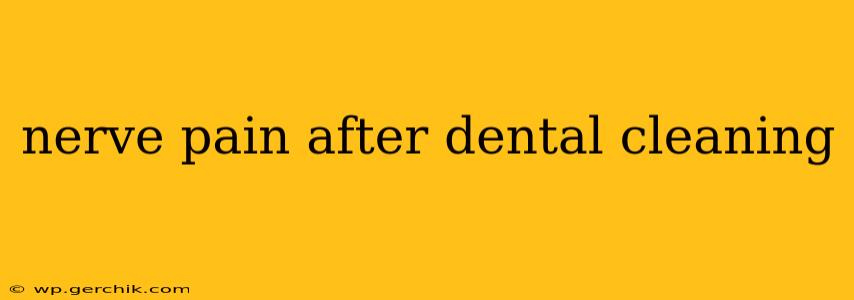Dental cleanings are essential for maintaining good oral hygiene, but sometimes, they can lead to unexpected complications, such as nerve pain. This can be a jarring experience, leaving you wondering what went wrong and how to find relief. This comprehensive guide explores the causes of nerve pain after a dental cleaning, effective treatment options, and preventative measures to minimize the risk.
What Causes Nerve Pain After a Dental Cleaning?
Several factors can contribute to nerve pain following a dental cleaning. It's crucial to understand that this is not a common occurrence, but when it does happen, it can be quite distressing. The most likely causes include:
-
Trauma to the nerve: While unlikely, accidental damage to a nerve during the cleaning process is possible. This might involve the application of excessive pressure, the use of overly sharp instruments, or unintentional contact with a nerve during scaling or root planing. The severity of the pain will depend on the extent of the damage.
-
Inflammation: Inflammation in the gums or surrounding tissues, triggered by the cleaning itself, can put pressure on nearby nerves, leading to pain. This is more common if you have pre-existing gum disease or sensitivity.
-
Sinus infection: This might seem unrelated, but pain originating from a sinus infection can sometimes be perceived as tooth or nerve pain, especially in the upper teeth. A dental cleaning might not directly cause the infection, but if one is already present, the procedure could temporarily exacerbate the pain.
-
Referred pain: Pain originating from a different source, like the jaw joint (temporomandibular joint or TMJ) or neck muscles, can sometimes be felt as tooth or nerve pain. This referred pain can be worsened by the actions involved in a dental cleaning.
-
Pre-existing conditions: Individuals with conditions like trigeminal neuralgia (a chronic pain condition affecting the trigeminal nerve) may experience an increase in pain intensity after a dental cleaning due to manipulation of the area.
How Long Does Nerve Pain After a Dental Cleaning Last?
The duration of nerve pain varies considerably depending on the underlying cause and its severity. In most cases involving minor inflammation or temporary irritation, the pain should subside within a few days to a week. However, if the pain is severe, persistent, or accompanied by other symptoms (like numbness or tingling), it's crucial to consult your dentist immediately. Prolonged pain might indicate more significant nerve damage requiring further investigation and treatment.
What to Do if You Experience Nerve Pain After a Dental Cleaning?
If you experience nerve pain after a dental cleaning, take the following steps:
-
Contact your dentist: This is the most important step. Your dentist can assess the situation, identify the cause, and recommend appropriate treatment.
-
Over-the-counter pain relief: Medications like ibuprofen or acetaminophen can help manage mild to moderate pain. Always follow the recommended dosage.
-
Apply cold compresses: Gentle application of a cold compress to the affected area can help reduce swelling and inflammation.
-
Avoid irritating substances: Refrain from consuming excessively hot or cold foods and drinks, as well as highly acidic or spicy foods, which can further irritate the sensitive area.
Can Nerve Damage From a Dental Cleaning Be Permanent?
While rare, nerve damage from a dental cleaning is possible, and in some instances, it can be permanent. The likelihood of permanent damage depends on the severity of the injury and the individual's healing response. Prompt treatment is crucial to minimize the risk of long-term complications. If your pain persists or worsens, seeking immediate professional help is vital.
How Can I Prevent Nerve Pain After a Dental Cleaning?
While you can't completely eliminate the risk, you can take steps to minimize it:
-
Inform your dentist about any pre-existing conditions: Let your dentist know about any medical conditions, especially those affecting your nerves or gums, before your cleaning.
-
Choose a reputable dentist: A skilled and experienced dentist is less likely to cause accidental nerve damage during the cleaning.
-
Maintain good oral hygiene: Regular brushing, flossing, and using mouthwash can help prevent gum disease and reduce the risk of inflammation.
Is Nerve Pain After a Dental Cleaning a Sign of Something Serious?
Nerve pain after a dental cleaning isn't automatically a sign of something serious. Often, it's a temporary irritation that resolves quickly. However, persistent or severe pain, numbness, tingling, or other unusual symptoms warrant a prompt visit to your dentist to rule out more significant underlying issues.
This information is for educational purposes only and should not be considered medical advice. Always consult with a qualified dental professional for any concerns regarding your oral health.
